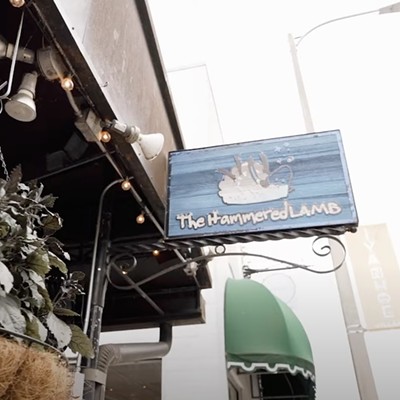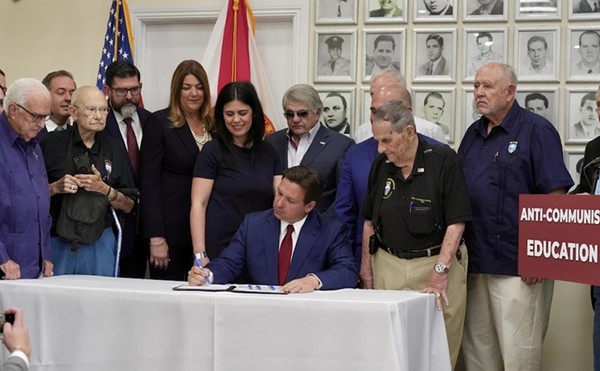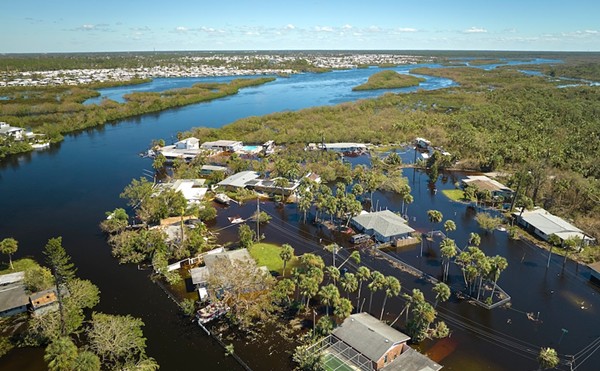;In 1875, New Yorker George Colby and three spirit guides hiked through the brush and muck of Central Florida until they came across a serene place of rolling hills and ponds. Colby was a spiritualist – someone who communicates with the dead through mediums and séances – and he wanted to establish a spiritualist camp in the South. He found a property and, in 1880, filed a homestead for 74.4 acres with the state of Florida. About 15 years later (there is some confusion on the exact dates), Colby deeded 35 acres of his land to the newly formed Southern Cassadaga Spiritualist Camp Meeting Association.
;;His outpost, which has grown to 57 acres, still exists nearly 113 years later, a short jaunt off I-4 between Orlando and Daytona Beach. Today it's more than just a place where psychics give readings and spiritualists gather for prayer. Cassadaga now attracts thousands of tourists, who are drawn to the camp's otherworldly appeal and harmonious vibe.
;;But underneath the veneer is a town in turmoil. Allegations of corruption, embezzlement, mismanagement and power struggles among camp members have plagued the community almost since its inception. Within a year of the camp's founding, longtime residents say, the community splintered (though, once again, the history is a little confused on the exact reasons). Not long after that, Colby himself was ejected for "behavior unbecoming a spiritualist" after he cursed during a debate with the camp's board of trustees.
;;Things are still tumultuous today, with the camp divided into factions. Critics have labeled members of the camp's leadership "the dark side," accusing them of power-mongering and ineptitude; there is even a suggestion that camp leaders are intentionally driving Cassadaga into bankruptcy so it can be sold off for development.
;;"Dark-siders," for their part, say they are besieged by whiners mounting a smear campaign aimed at gaining power.
;;While it's nearly impossible to determine exactly where the truth lies, one thing is certain: Modern-day Cassadaga is not the peaceful utopian oasis it appears to be, and is probably nothing like what George Colby had in mind.
;;;Money trouble
;Financial turmoil is ingrained in Cassadaga's history. On Christmas Day in 1926, the Cassadaga Hotel burned to the ground. Camp members rebuilt it the next year, but mismanaged the reconstruction bonds and ended up having to sell it to private interests in 1933. In the 1960s, the camp handed over Colby Park to Volusia County in exchange for forgiveness of back taxes.
;;In the 1980s, former camp member and treasurer Jodi Anderson says, camp trustees had to place a $60,000 mortgage on the office and the bookstore after being backed into a corner by sloppy financial management.
;;"It's been going on since the very beginning," Anderson says.
;;The camp is a 501(c)(3) religious organization, which means that it pays no taxes and its financial records aren't open for public inspection. Camp trustees declined to provide records. However, internal documents obtained by Orlando Weekly give insight into the camp's finances.
;;According to a document delivered to the board of trustees on Jan. 22 titled, "Looking forward to the new year," Cassadaga's administration took in $213,262 during its fiscal reporting period in 2006. However, it spent $215,169, yet still somehow claimed a net income of $8,370. In any event, it's better than 2005's reporting period, when the administration's "net income" was $28,246 in the red, according to the same document.
;;The community's bookstore fares a little better. During the fiscal reporting period of 2006, it had nearly $300,000 in sales, with a reported net income of $59,000. During that same span of 2005, the bookstore took in $240,350 and made $5,817 in net income.
;;But some of the camp's money, it seems, is gone. On Feb. 2, 2006, Mannie Billig – who has since become the camp's president – called the Volusia County Sheriff's Office to report $26,000 missing. According to police reports, there are records of unauthorized ATM withdrawals and missing deposits. Billig told the cops the camp wanted to press charges.
;;Two months later, the camp elected a new board of trustees; that body told investigators to drop the case, according to police. Lawrence Damasio, then the treasurer, told police the money wasn't really missing and the dispute was political in nature.
;;A year later, a new board took over, and again reversed itself. At that board's request, the sheriff's office reopened the case, and in early August recommended that the state attorney file grand theft charges against Thomas Anthony Roy, a former association director, for allegedly depositing $1,475 in camp funds into his personal account. No charges have been filed against Roy to date.
;;As for the rest of the missing $26,000, the camp's sloppy record-keeping has made it impossible to track, says Volusia County Sheriff's Office investigator Trevor Henderson.
;;In November 2006, the camp reprimanded Esther Seymour-Vogenitz, former bookkeeper and current trustee, saying she mishandled funds, according to camp documents. They forced her to pay back $216 she allegedly stole.
;;Seymour-Vogenitz says she didn't do anything wrong. "The alleged theft was this: Certain people wanted me out of the political picture so they took the funds my husband earned from his seminar as a ‘sanction,'" she wrote in an e-mail to the Weekly.
;;When the new board of trustees took over on April 1, 2007, Seymour-Vogenitz says, it found that she had actually overpaid the camp and reversed the sanction.
;;That kind of back-and-forth is what makes it difficult to determine what's really going on in Cassadaga.
;;"It's sad what's going on there," says former member Anderson, who says she didn't learn about the missing funds until becoming the camp's treasurer in May 2006. "I saw that the money was missing. It's very unfortunate that [the board] wanted to cover everything up. There's cold hard evidence, and it was still going on when I left [in May 2007]."
;;Anderson says the camp was teetering on the verge of bankruptcy. She left and revoked her membership when, she says, it became clear there was no accountability.
;;Damasio, also a former treasurer, disputes Anderson's claim of financial peril, and says such accusations are politically charged. He says it was Anderson who bungled the books. "I have no idea what [Anderson] did," he says. "There were not even standard profit-and-loss statements while she was there."
;;The camp's current treasurer, the Rev. Stephen Adkins, says the real issue isn't missing money, but misguided priorities, such as trustees who would rather have a large staff instead of spending money repairing the camp's buildings.
;;;Muzzle the opposition
;There are currently about 200 camp members. Membership costs $30 a year, and for that you get access to church services, private trustee meetings and the right to vote for the volunteer seven-person board that governs the camp. The board decides how the camp will spend its money, and also appoints the camp's president and dictates who is allowed to perform readings.
;;Since May, Billig has served both the camp's president and the association director, after the last director was fired for allegedly e-mailing trustees a negative article written about the camp, according to a camp source.
;;That's also a familiar refrain. Camp leaders apparently don't like being questioned, and will wield their authority to revoke memberships – since you can't live in Cassadaga if you're not a member, this effectively means evicting residents from their homes – to muzzle dissent.
;;That sort of thing is nothing new, either. In the 1970s and 1980s, the Rev. Eloise Page was a revered medium at Cassadaga. There's even a park named after her. Yet during the 1990s she became a target of the camp powerful who, according to Page's friends interviewed for this story, threatened her ability to do readings – which in turn threatened her livelihood – after she criticized how the camp was run. (Page died last year at 96.)
;;More recently, Trish Smith nearly lost her membership after she pushed for an audit of Cassadaga's books before the missing money was discovered in 2006. She says she only kept her membership by backing down. Although she's still a camp member, Smith moved to Gainesville in July.
;;"There are unfounded accusations and trumped-up charges for people who disagree or question what they're doing," says a source, a current camp member who asked not to be named. "They're threatening people's memberships to get rid of the people who disagree with them to secure power."
;;Billig, the present camp president, calls such criticism a smear campaign borne of disagreements. "When you don't do what they want, they smear you," he says.
;;Still, trustees are very protective of the camp's image. Weeks before this article went to print, trustee Seymour-Vogenitz sent an e-mail castigating Orlando Weekly for its inquiries: "I am wondering why a reporter for Orlando Weekly would want to take up the cause of a disgruntled church member? The board of trustees upon advice from our attorney asked certain people to stop these libelous and slanderous allegations. [B]ecause of their positions in the camp politics they were opening the camp up to a lawsuit. Now they've enlisted your help?
;;"Cassadaga is a wonderful place and the help that our mediums and healers do for people who visit is worth a story by you and the press. But a one-sided story from someone who didn't get their way and took the football and went home? Don't journalists get a bad name for stuff like that?"
;;;Commercial mayhem
;In recent years, Cassadaga has been caught between conflicting goals: Should the camp remain true to its spiritualist roots, or should it try to attract more tourists? Add to that the fact that it sits on some of the most beautiful land in all of Central Florida, and you have a recipe for conflict.
;;"We do have some members that would like to see our land sold off," says Rick Smith (no relation to Trish Smith), who was a trustee at the time of his interview with Orlando Weekly, but was stripped of the title shortly thereafter because, he says, he filed a police report regarding a scuffle at a May trustee meeting.
;;Camp members say that two developers have expressed interest in the land, and are especially interested in 27 undeveloped acres the camp owns. But in order to sell the property, 75 percent of members would have to give their consent, according to the bylaws.
;;Billig says that won't happen. "Most of the membership would have to agree to sell the land. It's very doubtful the membership would vote for that."
;;Billig says the camp is "doing OK financially. I think the camp is improving financially. We'd always like to have more."
;;So the camp is moving toward the more-tourism philosophy. Where it once tried to attract spiritualist pilgrims, today its crowds are weighted heavily with tourists (at least hundreds a week). The April release of Cassadaga by indie rock band Bright Eyes, inspired by singer Conor Oberst's visit, also has helped generate a tourism spike.
;;Camp members have debated other money-making ideas, such as bottling their own water or renting out camping lots, but none have come to fruition. Billig doubts the camp could handle such lofty projects. (Last year the camp turned down a contract to be the backdrop for an NBC reality show, Damasio says.)
;;For now Cassadaga markets $15 tours and $25 orb photography classes, giving tourists the opportunity to take guided nighttime walks in search of energy hot spots. It also has held events the last two Halloweens, over the objections of some Cassadaga members who fear attracting a crowd that comes only for the novelty.
;; "I have not advocated the celebration of Halloween, embracing the very things we deny," Adkins, the treasurer, says. "I have no problem with newcomers, but I don't think we need to do that to bring in newcomers."
;;;Sundown
;At sundown on a recent afternoon, the camp bustles with visitors seeking a glimpse into their future or looking to contact a deceased loved one.
;;The place looks and feels like nowhere else in Central Florida. From Stevens Street, the main drag, you can see most of the four dozen Victorian-era houses that line the single-lane roads. Often you'll find a pack of British tourists milling about, asking the locals where to find psychic readings. Or maybe you'll see residents – healers and mediums dressed in flowing broomstick skirts, with crystals and medallions around their necks – relaxing on long porches, sipping tea and chatting about buying crystals and the grueling summer heat. The air is often thick with the scent of incense. There's a park-like meditation garden in the midst of the homes, as well as Colby Memorial Temple, the community's church.
;;A middle-aged man with graying hair and a burly mustache leaning on the wooden bars of the bookstore's balcony lights a pipe filled with a sweet, fruity tobacco. The setting sun rages like a bright orange fireball in the sky. Cawing birds can be heard off in the distance.
;;The man grins. He's fully aware of the camp's troubles. "Sometimes politics are just too much here," he says, gesturing toward tourists holding hands as they walk down the street. "It's not always like this. But this is why we stay. This is what Cassadaga is about, a peaceful escape."
; [email protected]

















